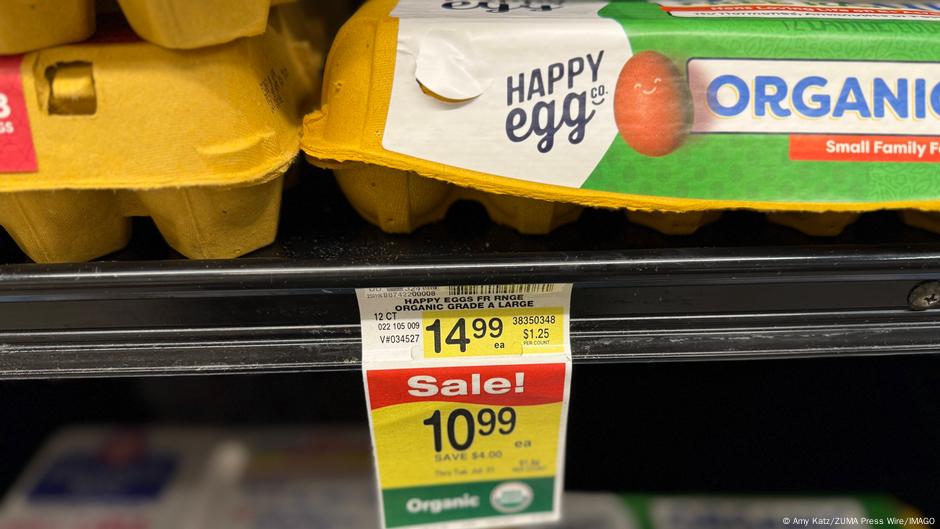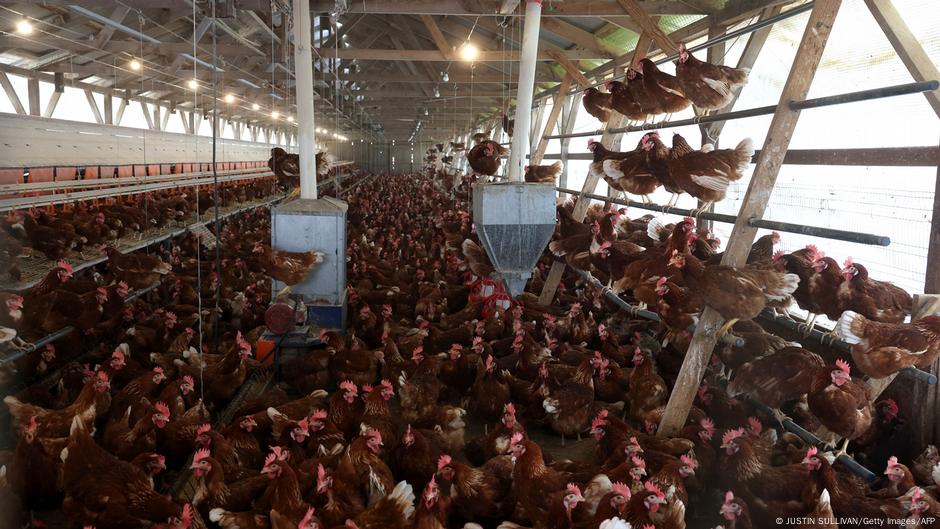
An avian influenza outbreak in the United States has caused egg prices to surge over 150% within a year. The government in Washington is said to have asked Europe for help by exporting extra eggs, yet as of now, just one or two European nations have developed a strategy to address this issue.

Recently, many U.S. consumers have seen the price of a dozen eggs exceed $10 (€9.22), following an outbreak of highly pathogenic avian influenza (HPAI). This led to both an egg shortage and a dramatic increase in costs.
Since the initial detection of the H5N1 avian influenza strain by U.S. officials in early 2022, over 166 million wild and domestic birds have been euthanized.
This week, the United States Department of Agriculture (USDA) announced that over 30 million hens have been culled since the start of the year.
The most recent losses represent 12.3% of the country's total population of caged birds and almost 8% of the free-range flock. However, the organic flock remains mostly unaffected by this outbreak, as reported by the USDA data.
The USDA disclosed outbreaks at poultry and dairy facilities across nine U.S. states, as stated in their most recent Egg Market Overview released on March 14.
Due to a significant egg shortage and price increases of 159% over the past year, certain supermarkets have started limiting how many eggs each customer can purchase.
In recent weeks, U.S. officials have reached out to multiple European nations seeking assistance to address the shortfall, despite growing trade tensions Between U.S. President Donald Trump's administration and the European Union regarding trade tariffs.
Multiple news sources indicated that farming organizations in Denmark, Sweden, the Netherlands, Germany, Spain, France, and Italy were contacted to determine whether they could ship their surplus produce across the ocean.
Is Europe able to provide extra eggs?
Over the last three years, Europe has been dealing with its own avian influenza outbreak, resulting in egg shortages throughout the region.
Poland, Hungary, and France have experienced some of the most significant impacts, and in January, Portugal announced an outbreak at a poultry farm close to the capital city, Lisbon.
This year, stringent disease containment strategies have been enforced across the United Kingdom after a potential instance of bird flu was reported in County Tyrone, which is part of Northern Ireland.
Historically, the United States has enforced limitations on bringing eggs into the country from most European Union nations because of worries regarding poultry illnesses, particularly avian influenza.
Because of their own egg shortages, many European nations claim they have little ability to ship eggs to the United States.
Hans-Peter Goldnick, who leads the German Egg Association, states that although Germany did export certain quantities of eggs through the commodities trading sector referred to as the spot market, these volumes were minimal.
Addressing the German public broadcaster NDR on Wednesday (March 19), he stated that there would be enough eggs available for Easter, but he advised Germans to keep their consumption patterns normal and avoid hoarding eggs.
Germany does not have significant surplus production, instead importing over twenty-five percent of its required eggs for consumption in 2023, as reported by official statistics.
A Finnish poultry authority informed the public broadcaster Yle that the Scandinavian nation likely won’t be capable of assisting due to U.S. import limitations.
Even if the red tape could be overcome, Finland only has four million laying hens for its own needs with little excess supply.
Swedish and Danish authorities mentioned comparable red tape and scarcity issues as obstacles to providing swift assistance to the U.S.

Does anyone have extra eggs available for shipment to the United States?
Recently,ReutersreportedthatTurkeyplannedtoincreaseitseggexportstotheUSbyagreeingtosupplyanadditional15,000tonsofeggsunderatemporaryarrangementwithWashington.
Ibrahim Afyon, the chairperson of the Egg Producers Central Union in Turkey, stated that from now until July, the nation will supply approximately 240 million eggs, which is roughly six times the amount exported to the United States in 2024.
These extra exports will bring in approximately $26 million in revenue for Turkey.
Last month, according to a report by Bloomberg, the U.S. intends to reintroduce import permits for Dutch egg products as an effort to alleviate the current domestic egg scarcity.
The Netherlands leads as the top global exporter of eggs, with plans encompassing shipments of both liquid and powdered varieties. This information comes from the European Union of Wholesale in Eggs, Egg-Products, Poultry and Game (EUWEP).
In addition to import limitations, Europe would encounter logistical challenges when shipping eggs across the Atlantic because of their delicate nature and the essential requirement for maintaining specific temperatures.
Air cargo is costly, whereas sea shipping would be too time-consuming and could shorten the eggs' freshness span.
For how long will the US egg shortage persist?
In the last month, egg prices in the United States have dropped significantly, largely due to decreased demand and increased supply.
Following a peak of average wholesale prices at $8.15 in mid-February, they have currently dropped by half, as per USDA data. It may take some time before these price reductions become evident for consumers.
However, demand might increase once more in the upcoming months, and the ongoing bird flu outbreaks could keep affecting egg production.
Substituting culled hens and letting them mature to an age where they can lay eggs is a lengthy procedure, lasting between 4 to 5 months. Despite this, when these birds begin to produce eggs, their output starts off low but steadily grows over time.
Hatcheries require time to increase the production of new pullets (young hens) as well, largely because of stringent biosecurity protocols that create bottlenecks.
A lot of egg suppliers might refrain from restocking due to concerns about additional avian influenza outbreaks.
Considering all these elements, numerous specialists predict that egg prices will stay high, with the scarcity likely continuing through the remainder of the year.
Edited by: Uwe Hessler
Author: Nik Martin

Our website uses cookies to improve your experience. Learn more